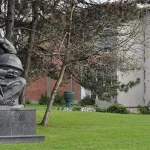ZAGREB, December 5, 2018 – The project “Using synergy to achieve excellence in the research and development of detectors, sensors and electronics” is the first successfully completed structural project in Croatia, finished in a record-short period of six months, which was marked with a ceremony inaugurating the Centre for Detectors, Sensors and Electronics at Zagreb’s Ruđer Bošković Institute (IRB) on Wednesday.
The primary goal of the project was to promote, in a synergy with the project “Expanding Potential in Particle and Radiation Detectors, Sensors and Electronics in Croatia” (PaRaDeSEC), financed within the Horizon 2020 programme, the IRB’s existing research infrastructure for the research, development and testing of detectors, sensors and related electronics, said IRB director David Matthew Smith.
He noted that this was the first successfully completed project in Croatia that was financed as part of the European Structural and Investment Funds in the amount of 1.5 million kuna.
Smith said the project was of great importance for the further planning of investments in science through the Operational Programme “Competitiveness and Cohesion 2014-2020”.
Science and Education Minister Blaženka Divjak, who attended the inauguration ceremony, said that promoting excellence and innovation was one of her ministry’s four important strategic goals in the current period. She noted that “promotion of excellence… seems easy on paper, but the required change of the system actually requires everyone involved in that system to change.”
The minister said the project was a good example of how the Horizon 2020 programme, which is mostly oriented to science and excellence, can be linked with cohesion policies, which help develop countries that lag behind in any sector.
She thanked the project team, headed by Neven Šoić, for identifying that link and making it possible to complete the project in record-short time.
The project has made it possible to procure a large number of instruments important for research, as well as remodelling laboratories, thus creating controlled conditions of cleanliness, temperature and air humidity, improving the stability of electric systems and reducing the level of electronic noise, said Šoić.
For the latest science news from Croatia, click here.








